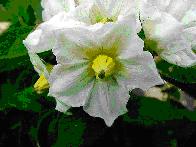
James Clark, 1825-1890, Potato Breeder
James Clark was a horticultural expert who worked from his home in Christchurch, Hampshire. He was perhaps one of the first 'hybridists'. This was the term used by plant breeders when they pollinated one variety with another to perform definite crosses, making sure that that the pollen of variety X was used on flowers of variety Y, steps being taken to prevent chance or self-pollination.
He used 'Early Rose' and 'Victoria' as parents and produced a number of well-known varieties over a period of about 20 years, including 'Maincrop'(1876), 'Magnum Bonum' (1876), 'Abundance' (1886), 'Ninetyfold' (1897) and 'Epicure' (1897).
The most famous ones are Magnum Bonum, Ninetyfold and Epicure; the last of these is still grown today.
For decades Epicure was the leading potato variety in England and Wales, until displaced by Arran Pilot and Home Guard, which cook more firmly. It was used as the parent for a number of other varieties, the best known being Sutton's Foremost.
NOTES ON THE VARIETIES:
EPICURE (1897)
This was introduced 7 years after Clark died, and seed is available for amateur growers today (2010); I think it is still grown commercially in small acreages in Scotland. It is a good flavoured floury first early. I've grown this a couple of times and was impressed.
Flowers

Tubers

MAGNUM BONUM (1876)
This variety was Clark's first commercial success. It was trialled at Stoke Newington, and from there it was passed to Suttons who bought the variety and introduced it in 1876. It was an excellent flavoured floury potato, popular until the turn of the century, peaking in 1890. After that it degenerated and became susceptible to blight. It was used in the breeding of King Edward, Arran Victory and Arran Banner.
NINETYFOLD (1897)
This was a good yielder; no longer available commercially but still existing in collections. It was a first early, waxy, not such good cooking quality as Epicure or Magnum Bonum, but sufficiently good to be grown commercially until 1960.
ND / Diversity website